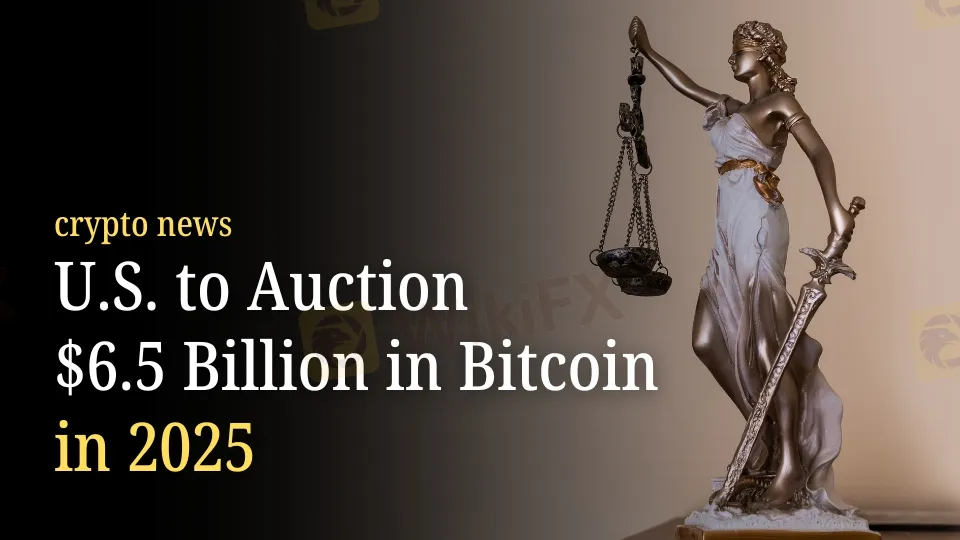U.S. to Auction $6.5 Billion in Bitcoin in 2025
Abstract:The U.S. government plans to auction $6.5 billion in Bitcoin seized from Silk Road in 2025. Analysts debate market impact as BTC prices show mixed reactions.

The US Department of Justice (DOJ) will auction off $6.5 billion in Bitcoin confiscated from the notorious Silk Road dark web bazaar. This judgment comes after a court verdict on December 30 that ended a protracted legal fight over the ownership of certain digital assets.
The Impact of Government Bitcoin Reserves on Auctions
According to Arkham Intelligence, the United States government now has 198,000 BTC worth around $18.5 billion. This reserve includes the Bitcoins up for auction.
Analysts believe the Biden administration may sell Bitcoin before Donald Trump takes office. According to Fox Business contributor Jason Williams, the Trump administration plans to take advantage of the present bull market, perhaps compelling it to repurchase at greater prices.
“This is a blatant perversion of the government's fiduciary responsibility,” he said.
Bitcoin Price Changes and Market Implications
Bitcoin prices fell by 2.78% following the court verdict, prompting fears about future price declines if the auction fills the market. Government Bitcoin auctions have always had a modest impact on market pricing.

From March 2023 until the present, the US government's Bitcoin holdings fell from 236,000 BTC to 198,000 BTC, a 38,000 BTC reduction worth $3.54 billion. Despite the sell-off, Bitcoin values rose by 375%, owing to expectations about spot Bitcoin ETFs and suggestions to put Bitcoin in US strategic reserves.
Auction Method: Public Auctions vs. Market Sales
To sell seized Bitcoin, the United States government often holds public auctions through the US Marshals Service. These auctions are preferred over direct exchange sales because they reduce market interruptions that may result in severe price drops.
Critics emphasize the government's squandered potential for greater earnings. Since it began its Bitcoin confiscation, the government has sold 195,092 BTC for $366.5 million. At today's values, this sum is worth $18.25 billion, implying a $17.9 billion loss.
Analysts Urge Calm Amid Massive Auction
Despite the upcoming $6.5 billion auction, economists urge caution. According to Ki Young Ju, CEO of CryptoQuant, the $6.5 billion offered by the US government may be consumed in only one week. Don't freak out.
Legal Battles Over Seized Bitcoin Resolved
In October, the Supreme Court of the United States declined to hear a lawsuit involving 69,370 BTC confiscated from Silk Road. Battle Born Investments, which claimed rights to Bitcoin through a bankruptcy estate, had challenged previous verdicts but was denied a hearing.
This result supported prior court decisions that Battle Born had no genuine claim to the Bitcoin confiscated following Silk Road's shutdown in 2013.
Future Auctions and Government Custody Solutions
For bitcoin custody, the United States Marshals Service utilizes Coinbase Prime. Earlier this year, it paid $32.5 million for Coinbase Prime's service to move $2 billion in Bitcoin-related to Silk Road.
Final Thoughts
The next $6.5 billion Bitcoin auction illustrates the United States government's expanding role in Bitcoin asset management. While concerns about the market effect persist, the auction highlights the growing integration of digital currencies into financial systems. As markets prepare for the event, the long-term consequences for Bitcoin and its place in US economic policy remain unknown.

Read more

B2BROKER Launches PrimeXM XCore Support for Brokers
B2BROKER launches PrimeXM XCore support and maintenance services, enhancing trading efficiency for brokers with expert management and optimization.

EU MiCA Update: 10 Authorized Stablecoin Issuers & 11 CASP Providers
Under MiCA, 10 firms have been authorized to issue e-money tokens (EMTs), commonly known as fiat-backed stablecoins. These issuers have launched a total of 15 EMTs, consisting of 10 euro-denominated tokens and 5 US dollar-denominated tokens.

Google Bitcoin Integration: A Game-Changer or Risky Move?
Google Bitcoin integration blends wallets with Google accounts, stirring security fears and adoption hopes. ZKP encryption aims for privacy.

XTB Secures Chilean License, Expands Latin America Footprint
XTB gains a securities agent license in Chile, boosting its Latin America presence. The broker plans to offer stocks, ETFs, and derivatives to local investors.
WikiFX Broker
Latest News
Pi Network Mainnet Launch: Game-Changer or Crypto Controversy?
GlobTFX Users Report Same Issue! But Why?
Rate Cut or Not? It Depends on Trump’s Policies
Why Do You Keep Blowing Accounts or Making Losses?
eToro Adds ADX Stocks to Platform for Global Investors
B2BROKER Launches PrimeXM XCore Support for Brokers
Germany's Election: Immigration, Economy & Political Tensions Take Centre Stage
WikiFX Review: Is IVY Markets Reliable?
WikiFX Community Creator Growth Camp
Effect of Tariffs on Gold and Oil Prices
Rate Calc

